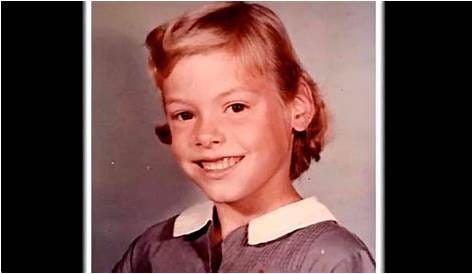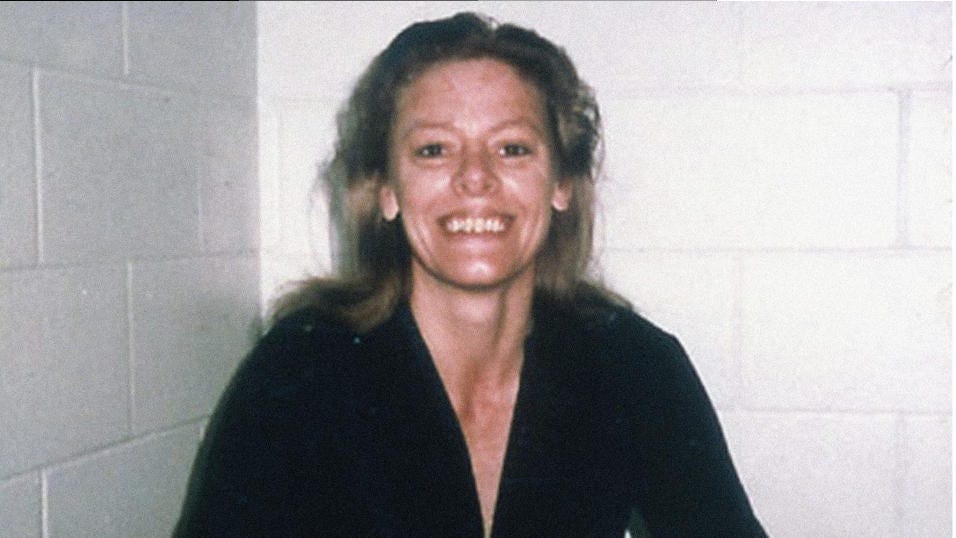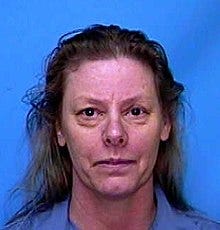Aileen Wuornos Tells Me It's Okay To Feel Like This
(This essay discusses sexual assault (though not in detail) and gendered violence, as well as murder.)
He asks me if I find Ted Bundy hot. We are sitting on my sofa and my head is on his chest and I can’t remember why we’re talking about this, but I want him to like me, so I’ll humour it. I tell him no, that Bundy isn’t my type. I joke that if he’d had a little earring, maybe, then reach up to poke at his. We talked about serial killers last time too – in a park where he made fun of me for freaking out at every rustle in the dark. I liked him too much to tell him I didn’t find it all that funny it when he pretended to have seen something in the bushes, jerked his body as if he was jumping out of his skin, four separate times.
When a man followed me home from the bus stop later that night, I called him at 2 am, knowing he would be awake on a night bus of his own. I didn’t know how to tell him that this was why I had been scared. That the fear is rational, for girls. Instead, I told him slightly flippantly that if I was murdered, the man was tall and broad and bearded, so he was safe from being a suspect. I said nothing when he didn’t check in in the morning, but briefly debated pretending to be dead until a couple of shots at a party crumbled my resolve and I texted to ask him when he was next free.
This may surprise you, but I actually don’t want to write about men. Apart from anything else, I have already done it too much - written through every slight and spark since I was nineteen – sometimes poetry, sometimes essays, always caught up in what some man has done, the way he made me feel. I’m frankly tired of it. I promise I don’t want to bore you about men.
I want to tell you about Aileen Wuornos. If it was in any way appropriate to have a favourite serial killer (it isn’t), I’d pick her. Someone, probably a man, nicknamed her the Angel of Death, but I’m going to call her Lee, because that’s what she called herself. You might not have heard of her – I hadn’t until I, aged seventeen, went to a poetry reading by American poet Olivia Gatwood, who shares a birthday with Lee and has written four separate poems about her. When I’m quoting Gatwood’s poetry, I’ll write in bold.
Lee was born in 1956 in Michigan to a 16-year-old mother, Diane. She would have grown up as a witness to the domestic abuse her father, Leo, inflicted on Diane if it weren’t for the fact that he killed himself in prison where he was serving a sentence for assaulting a seven-year-old girl. Instead, abandoned by Diane at the age of four, Lee was adopted by her alcoholic grandparents and was sexually and physically abused in their home, including by her brother, Keith. She was exchanging cigarettes for sexual acts by the age of 11, and at 14 gave birth in a home for unwed mothers after being assaulted by a family friend. She was kicked out of home by her abusive grandfather at 15, and turned to sex work to survive, often living in the woods. She attempted suicide six times between the ages of 14 and 22.
At 33, Lee killed seven men in the span of a year. The men she killed – an electronics store owner, a construction worker, a part-time rodeo worker, a retired merchant seaman, a sausage salesman, a former Chief of Police, a security guard – were all shot in the chest or head, often multiple times. She confessed to the murders on the phone to her girlfriend, Tyria Moore, who she had met in a gay bar three years prior (“…they never went on a date,/they simply/went home together and didn’t leave the house for a week.”). Tyria had been promised immunity by police if she elicited a confession from Lee, but all Lee wanted to talk about for three days on the phone was how much she loved Tyria. How she was her left arm, her right arm, her breath. Eventually, she told Tyria that she had killed the men in self-defense after they had each tried to assault her.
At trial, her defense introduced evidence that her first murder victim, Richard Charles Mallory, had been convicted of attempted rape in Maryland. The judge dismissed the evidence, as well as Lee’s request for a retrial. In court, Lee stated: "I wanted to confess to you that Richard Mallory did violently rape me as I've told you; but these others did not. [They] only began to start to." She was sentenced to six death sentences in total, one for each of the murders apart from one for which no body could be found. A crucial part of the prosecution’s case was Tyria’s testimony. Lee stated in court "It was love beyond imaginable. Earthly words cannot describe how I felt about Tyria."
She later retracted her claim of self-defense and said she wanted to rob her victims and leave no witnesses, hence having to kill them. But when she believed cameras to be off during the filming of a documentary, she told director Nick Broomfield that the self-defense claim had been true, and she had retracted it because she thought it would mean she was executed faster. She had by that point been on death row for ten years, claiming that prison staff were poisoning her food with dirt and urine, cat-calling her and repeatedly kicking her cell door.
I think about what it must have been like to be Lee – to have grown up never experiencing love or care, to have been forced to make unthinkable decisions to survive. To have a newborn son ripped away from you before you’ve had a chance to hold him. To be driven to strange places by strange men, knowing that men have never once been good news. To keep getting into their cars anyway, because you have no choice.
I’m by no means suggesting Lee was blameless, that she never did anything wrong. “Aileen, I don’t love you. I like you./…Aileen, if you were my neighbour,/I would have built an eight-foot high-fence/between our houses.” Her life leading up to the murders had been a catalogue of bad decisions – driving under the influence, firing guns from moving vehicles, throwing a cue ball at a bartender's head, car theft, armed robbery (though I feel it would be remiss not to mention that she only stole $35 and two packs of cigarettes). She shot some of her victims in the back, which implies they were walking away, no longer attacking her if they had been in the first place. We don’t know what happened. I just wonder who Lee could have been if no man had ever hurt her. If she hadn’t felt the need to defend herself – whether the threats she claimed her murder victims posed to her were real or imagined, worn into her psyche after years of violence at the hands of men. Maybe she would have stayed with Tyria, carved out a life for the two of them somewhere far away. “So much land that if you shoot a bullet/it won’t hit anything until it skids through the dirt./So much land that if you scream/it won’t hit anything, just break away like mist/a few feet from your mouth.”
I said I didn’t want to talk about men. And I don’t. But the truth is that as someone who writes about her life, often intimately, I can’t help it. I can’t move through this world as a woman without violently colliding with them. Even if I swore men off, even if I resolved to never interact with them again – a nuclear boysober – they would still follow me off buses. They would still enact violence, and I would not be immune to it just because I was no longer giving them chance after chance to prove they can be tender. They would still hurt my friends in a myriad of ways. They would still kill one of us every three days. They would still be hired to protect us and then assault and kill us anyway. They would still share pictures of our dead bodies in group chats. I would still regularly read about rape trials prosecuting men from all walks of life, men like the men Lee killed, who she tells us attacked her first. Most men don’t get a frankly merciful bullet to the head or the chest when they try to attack us. They get away with it. For years. Decades. Most of them get away with it for their whole lives. They are promoted. They are allowed to tour their shows, get nominated for awards, and be elected to the highest office in the world. Walk free at the grocery store, try all the samples, go golfing on the weekend in their peach pressed pants. They are allowed to be loved as sons, fathers, partners. They are allowed to exist among us. We are called mad when we dare to be mistrustful.
On the sofa, with his arm around my shoulder, I tell him about Lee. I call her Aileen, not wanting to seem weird, like she’s my mate. I want him to stop talking about men who kill women in the abstract, hypothetical, detached way in which he’s doing it, so I tell him about the poems Olivia Gatwood wrote. I dig out my copy of her book in my bedroom, intending to read one to him, but then I forget to, caught up in the way it feels to forget about being threatened for a while and give in to being held instead. Besides, I don’t think he’d understand. I don’t think there is any point, when he laughed at the way she looked in her mugshot and rolled his eyes when I tried to tell him she killed in self-defense. “She killed seven men in a year,” he says, as if that proves anything at all. Lee once said that if a hundred men had tried to rape her, she would have killed a hundred men. “I told them I wanted to make sure the people who hurt me don’t ever hurt anyone again. And since you can’t ever be sure of that, I took their whole damn bodies.”
Lee was executed aged 46 by lethal injection in Florida in 2002 after spending ten years on death row. Her last meal was a cup of coffee (“I’m gonna ask for a black coffee because these motherfuckers don’t deserve to watch me enjoy something.”). She claimed she was still in love with Tyria. Her last words were "Yes, I would just like to say I'm sailing with the rock, and I'll be back, like Independence Day, with Jesus. June 6, like the movie. Big mother ship and all, I'll be back, I'll be back". Her ashes were scattered by a childhood friend, Dawn Botkins, back in Michigan.
He tells me she looks “mental” in her mugshot. I think she just looks worn out. I wonder if it is intense to write about this, in this way. To include him in this essay that I know he’ll never read. But I’m worn out too, and I want to write about it.
Three days after I try to tell him about Lee, we decide this isn’t working, from opposite ends of the sofa. It’s an awkward morning after a weird night. He does a lot of the deciding. I do a lot of the listening, interjecting only to tell him that what happened last night made me feel bad. Also that I hope his weekend trip is fun. That his grandfather recovers from his surgery. He tells me I have been so kind to him. That this has all been so peaceful. We hug each other before we say goodbye. Why shouldn’t I, when he is nothing like those men? His only crime, self-confessed, is being a coward – not violent, just careless with his words, his actions. I think to myself, as I close the door behind him, that I should have read him the poems. I should have told him she was tired. That I’m tired. “I wish you hadn’t hurt all those people./…I wish all those people hadn’t hurt you.”
Olivia Gatwood’s four poems about Aileen Wuornos are called: ‘Aileen Wuornos Teaches Me About Commitment’, ‘Aileen Wuornos Convinces Me To Put Down My Dog’, ‘Aileen Wuornos Isn’t My Hero’, and ‘Aileen Wuornos Takes A Lover Home’, which is the one I heard performed all those years ago. You can watch it being performed by Gatwood here. It’s also the one I would have read to the anonymous man I talk about in this piece.
All those poems are part of Gatwood’s incredible collection, Life of the Party – probably my favourite ever. It’s about a lot of things, but mostly growing up as a girl in a world in which men can be violent and tender and sometimes both. I would love to lend it to you if you’d like to read it.
I don’t listen to true crime podcasts apart from All Killa, No Filla, and they have a brilliant three-parter on Lee that you can listen to here.







